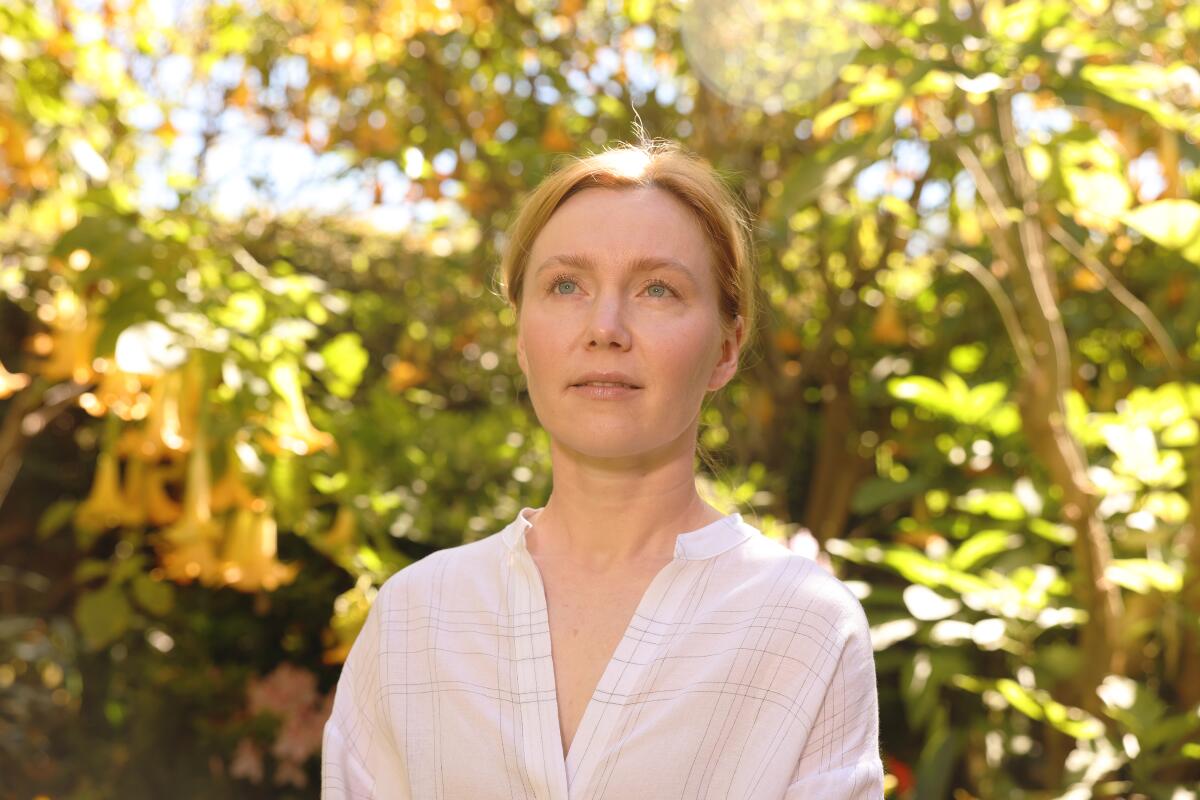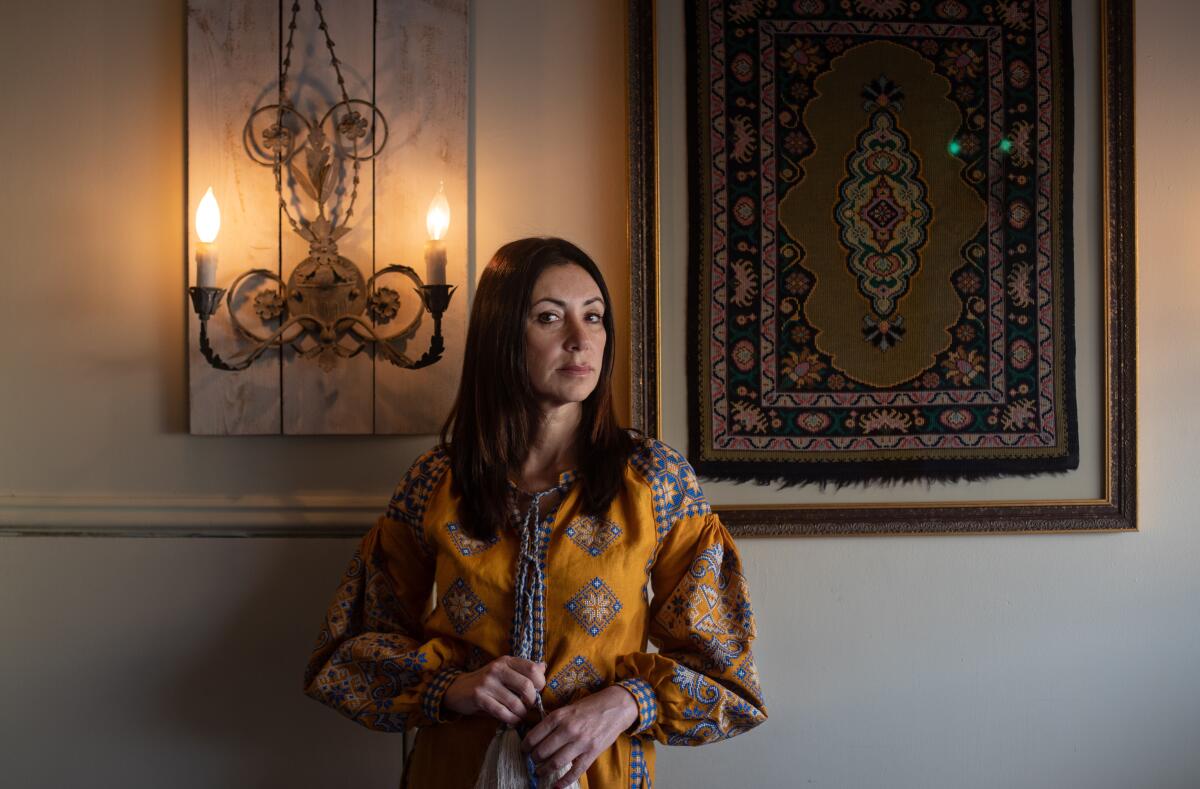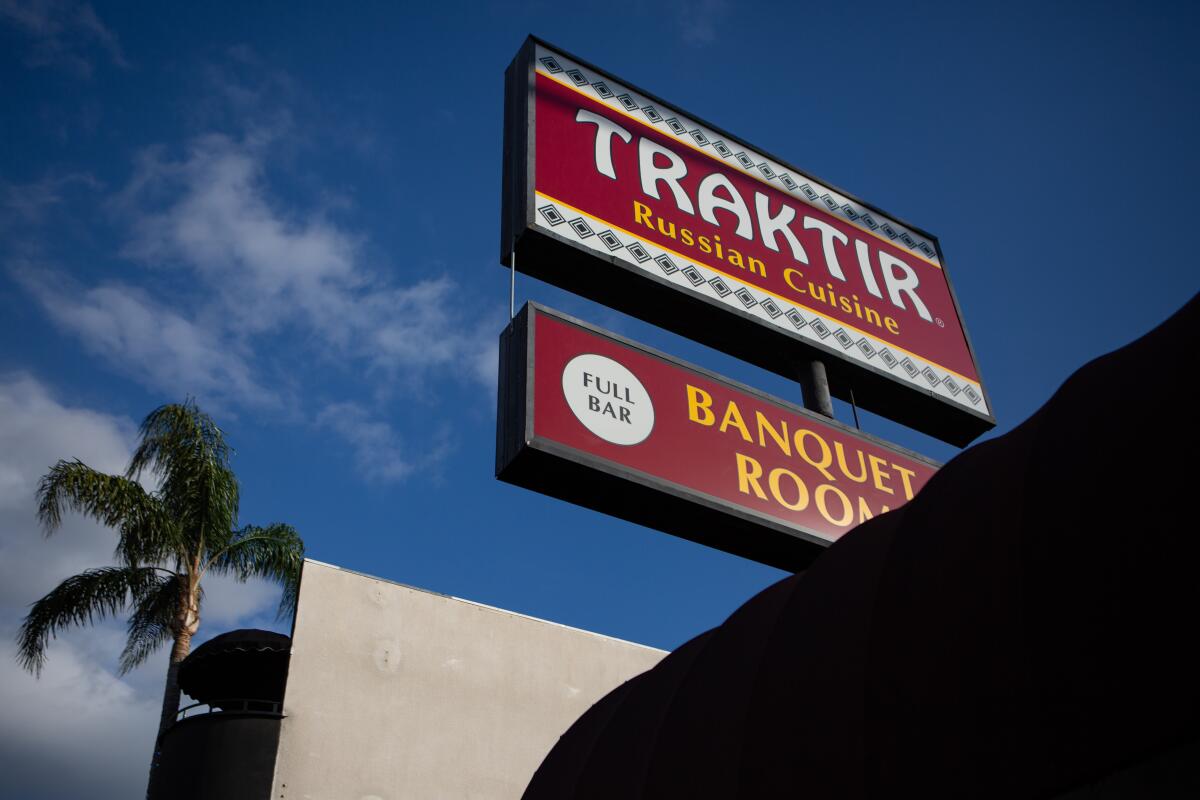In L.A.’s Russian diaspora, feelings of pride jostle with shame, guilt and fear

- Share via
The day Russia attacked Ukraine, Alya Michelson’s daughter came home from school distressed.
The young girl told her mother that she felt humiliated — ashamed, even — of her Russian heritage. She worried that she would be bullied when her Brentwood classmates learned more about Russian President Vladimir Putin’s brutal invasion, which already has resulted in hundreds of casualties and driven more than 2 million refugees from their country.
“You shouldn’t feel responsible,” Michelson recalled telling the 12-year-old as she sat with her in bed that night. “Especially, as an American, you have no control.”
In California, where the roots of the Russian-speaking community date from before the Alaska purchase of 1867, members of the diaspora have found themselves thrust into the center of a war thousands of miles away. Some worry that they will be associated with, and blamed for, Putin’s incursion despite having left their homeland years, if not decades, ago.
Others born in Russia who feel tied to Ukrainians by the threads that link their homelands say that they can’t help but feel a sense of guilt over Putin’s aggression, despite living in the United States and leading lives far removed from the Kremlin’s actions.
L.A.’s Russian-speaking diaspora has bonded over a shared language and history for generations, first in the enclaves of Boyle Heights, then in communities in Hollywood and, later, West Hollywood. The terms “Russian” and “Russian American” encapsulate multifaceted national, ethnic and religious identities: immigrants from Russia, Ukraine, Belarus and other countries that once composed the Soviet Union, who came to the United States for diverse reasons, including economic hardship, political oppression and religious and ethnic persecution.
“When we say Russian diaspora, we mean different ethnicities from the former Russian empire,” said Sasha Razor, a researcher of Russian immigration to Los Angeles. “‘Russian’ is somewhat of a misnomer. It can be a Jewish person from Odessa, which is now in Ukraine, who came in the 1990s.”
It is difficult to define what constitutes a Russian diaspora “because it is intersectional and diverse,” she said.
To Michelson, a philanthropist and former journalist born in Russia, watching the war in Ukraine feels like “a child watching two parents arguing while trying to get a divorce.” She feels angry and lost, she said, because there is nothing she can do to end the violence.
She fears that people may take their anger out on Russian Americans.
“I truly hope that people can distinguish Russians of several generations away from immigration from the regime,” she said. “If someone decided to emigrate from their homeland, there must be something significant going on behind that.”
Michelson, 38, spent much of her childhood in Ukraine, she said, and has ancestors “from both sides of the conflict zone.” Her daughter Sasha was born in Moscow, while her other two children were born in the U.S.
“For them, because they were not born there, it’s not personal at all,” Michelson said. “They came home excited about a fundraiser” on behalf of Ukrainian refugees.
But Sasha, she said, held a different understanding of the violence. The heritage she was learning to embrace through holiday celebrations or by learning how to tie a traditional Slavic braid suddenly felt like it was slipping away. A Russian link that she associated with her mother suddenly seemed shrouded in darkness, Michelson said.
So when it came time to console her, Michelson was unequivocal. “I said to her, ‘I’m Russian, I’m proud to be Russian.’”
“It was very important for her to hear that,” she added.
One of the largest streams of migrants arrived in the 1970s, when the former Soviet Union began allowing some citizens, mainly Jews, to leave. Many who chose to come to Los Angeles received aid from Jewish Family Services, an organization that was assisting Jewish immigrants with affordable housing in the West Hollywood area.
By the 1980s, West Hollywood had become the hub of the Russian-speaking community in Los Angeles. More than 300,000 members of the diaspora lived in the region as a whole, one of the largest Russian-speaking communities outside of New York, according to the city of West Hollywood.
“From perestroika to the collapse of the USSR onward, that immigration renewed, and that’s how we got West Hollywood,” Razor said, referring to the economic and political reforms instituted by former Soviet leader Mikhail Gorbachev in the 1980s. “Because the population is transnational, many came from Ukraine, Belarus.”
“If you look at names of shops there, it’s ‘Tblisi,’ ‘Yerevan,’” she added, alluding to the capitals of the former Soviet republics of Georgia and Armenia.
As Ukraine’s plight has spurred global condemnation of Putin, many Russian speakers have banded together in support of their sister nation.
Outside the Holy Virgin Mary Russian Orthodox Cathedral in Silver Lake on a recent weekday, Archpriest Nazari Polataiko stood in the church parking lot and reflected on the war. Half of his parishioners are Ukrainian, as he is himself.
“We don’t talk politics here, but peace is something we want to protect,” he said. “War is a sin.”
The church, under the guidance of the leadership of the Orthodox Church in America, has been helping collect funds for refugees from Ukraine.
“Yesterday, we sent parcels to help refugees in Poland,” Polataiko said. His church— the oldest Russian parish in Southern California — was egged on the first day of the Russian attack, he said, but he wasn’t sure whether the vandalism was linked to the violence in Ukraine.
Despite moving to the U.S. 18 years ago and becoming a citizen, Oleg Itskhoki said he can’t shake sorrow over Russia’s invasion, Europe’s largest conventional military action since World War II. He felt ashamed in 2014 when Russia annexed the Ukrainian peninsula of Crimea.
“It’s an internal feeling. It’s not imposed on you,” said Itskhoki, 39, a Moscow native. “It’s built into how you view yourself.”
An economics professor at UCLA, Itskhoki said that Russian citizens had ample territory, resources and opportunity to change the trajectory of the nation after the fall of the Soviet Union in 1991.
“At the end of the day, it’s people who live in that geography who are in charge of what will happen in that country,” said Itskhoki, whose father was born in Ukraine. “We started with a country that could have been free and prosperous, and we ended in this complete catastrophe.”
The West, he said, also made a mistake by not engaging more with Russia in the 1990s.
Itskhoki is part of several group chats on WhatsApp and Telegram with both Ukrainian and Russian members. On the Ukrainian side, his friends share the daily reality of war and how to safely get people out of the country. On the other, he hears from people in Russia who are trying to flee the country and withdraw money from banks because they worry about the effects of sanctions on the economy and fear political persecution.
“I understand the motives of people in both, but it’s this crazy discontinuity,” he said. “On one side they’re being bombed and the other is discussing how to get money out of the country.”
Itskhoki and his wife have found a community of Russian-speaking friends in California, most of them employed in the tech industry. Until recently, it wasn’t relevant that about half the people in the group were from Ukraine, he said.
Most people in the group share his sense of guilt and catastrophe, Itskhoki said.
“There’s different extents of it, but I think this is present for everybody,” he added. “This is broadly shared by Russians everywhere.”

Rina Atroshenko immigrated to the U.S. from Ukraine with her sister, parents and grandparents in the 1970s, resettling as part of the wave of Jewish migrants in West Hollywood before the Russian-speaking community there boomed.
“My father was a dentist, my mother was a pharmacist. They came out here, they worked minimum wage at $2.75 an hour, just for us and everybody to be safe,” she said. “In our passports, our nationality was Jew. We never belonged. We were never Russian.”
It wasn’t until they moved to the U.S. and people asked her parents where they were from that they responded, “Russian Jews.”
Sitting inside her restaurant Traktir on a Friday afternoon, Atroshenko said the food she serves is a mix of Russian and Ukrainian — a celebration of the commonalities between the cultures. The restaurant’s website boasts “authentic Russian cuisine” at both its West Hollywood and Tarzana locations.
Colorful rugs, knickknacks and nesting dolls dot the walls and nooks of the San Fernando Valley branch, where large jugs of dill pickle vodka (“the hangover cure”) and various fruit juices sit on the bar’s counter.
Since the war in Ukraine began, the restaurant has received a few disgruntled phone calls from people asking about its “Russian cuisine” label. One person called asking what type of food Traktir served. When an employee answered “Russian,” the man pressed further.
“So are you Russian?” he asked, according to Atroshenko. When the employee explained that she is Ukrainian, the man said, “Sure you are,” and hung up.
For Atroshenko, whose Ukrainian pride was on display in the black sweater she wore emblazoned with the Ukrainian flag, that type of division is worrying. She speaks Russian, not Ukrainian.
“I’m not going to turn around and explain myself to somebody,” she said. “But it just has to be understood that it was all one and people here don’t want this war. The Russians, the Ukrainians, nobody wants this separation. We still feel bonded and together in cuisine, culture and art.”

At dinnertime, Atroshenko said, it’s not uncommon to see a mixed table of Russians, Ukrainians or other Slavic diners eating next to a group of Armenians, Persians and other Americans.
“Nobody really sits and says, ‘Oh, you’re from here, you’re from there,’” she said as Russian pop music played in the background. “They just enjoy eating together and the food that we all grew up on. People here, they never argue about anything.”
If any debates do erupt, they’re lighthearted, she said — friendly quarrels over whether a specific dish is Ukrainian or Russian.
“Russian cuisine is from all the regions around. It’s brother and sister,” she said. “So, what do I do now? Do I rename it?”
More to Read
Sign up for Essential California
The most important California stories and recommendations in your inbox every morning.
You may occasionally receive promotional content from the Los Angeles Times.











